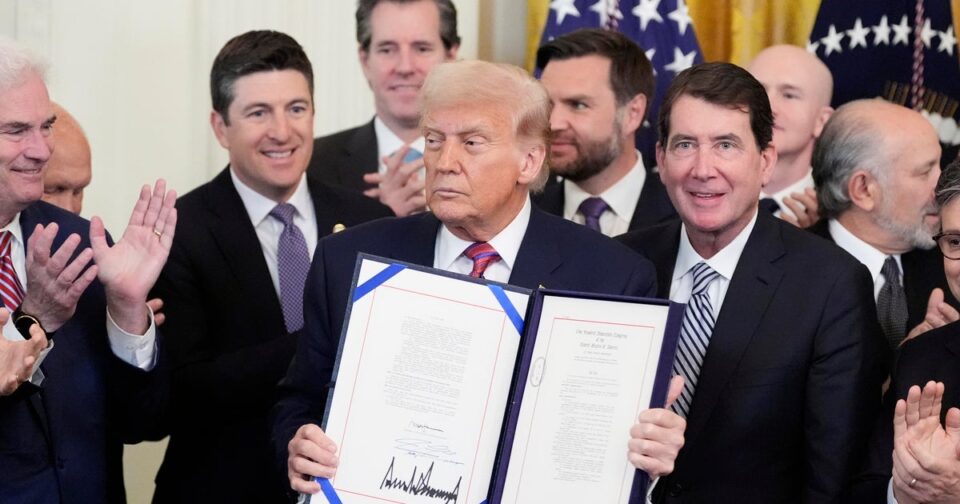Updated on: July 18, 2025 / 4:28 PM EDT
/ CBS News
Breaking down stablecoins and the GENIUS Act
What are stablecoins and how does the GENIUS Act regulate them?
06:57
Washington — President Trump signed a landmark bill to regulate cryptocurrency on Friday, hailing the “exciting new frontier” for the technology one day after the bill passed the House.
The legislation, called the GENIUS Act, is the first major law governing digital currency, and establishes a regulatory framework for the $250 billion stablecoin market. Stablecoins are viewed as a relatively safe type of cryptocurrency since their value is pegged to other assets, like the dollar. The bill passed the House on Thursday with the support of 206 Republicans and 102 Democrats.
“We worked hard. It’s a very important act, the GENIUS Act. They named it after me,” the president joked in the East Room of the White House. “I want to thank you. This is a hell of an act.”
Members of Congress and top executives from Robinhood, Tether, Gemini and other crypto and financial firms were in attendance for the signing ceremony.
The fate of the GENIUS Act was in question earlier this week when a dozen conservatives stymied a procedural vote. A compromise was ultimately reached, and the holdouts allowed the legislation to proceed. The president on Friday suggested that he spoke to the holdouts individually on the phone to persuade them, after House Speaker Mike Johnson told him there were a dozen Republicans opposing the bill.
“The good news is, I call up, ‘Hello, Jim, how are you?’ ‘Sir, you have my vote.’ Boom. ‘Sir, you have my vote.’ I really just, they just want a little love,” he said. “Unfortunately, it’s always the same 12 people.”
President Trump speaks at an event for the signing of the GENIUS Act, a bill that regulates stablecoins, a type of cryptocurrency, in the East Room of the White House on Friday, July 18, 2025.
Alex Brandon / AP
David Sacks, the venture capitalist-turned Mr. Trump’s AI and crypto czar, said the president “stepped in and saved this bill.” Mr. Trump also said Vice President JD Vance had been on the phone late at night, helping push the legislation through.
What is the GENIUS Act?
The GENIUS Act (which stands for Guiding and Establishing National Innovation for U.S. Stablecoins) establishes guardrails and consumer protections for stablecoins. The bill also creates a legal category for stablecoins and establishes clear boundaries for which digital currencies could be referred to as stablecoins.
With the GENIUS Act signed into law, banks, nonbanks and credit unions can dive into the market by issuing their own stablecoins.
Along with being less volatile than other virtual currencies, stablecoins can facilitate faster, lower-cost financial transactions, supporters of the technology say. Before the Senate vote on the Genius Act in June, Sen. Bill Hagerty of Tennessee, the bill’s sponsor, said stablecoins could allow businesses and consumers to settle payments “nearly instantaneously,” rather than taking weeks.
“Just as I promised last year, the GENIUS Act creates a clear and simple regulatory framework to establish and unleash the immense promise of dollar-backed stablecoins,” Mr. Trump said. “This could be, perhaps, the greatest revolution in financial technology since the birth of the Internet itself. A lot of people are saying that.”
The president said the GENIUS Act provides banks and other financial institutions a framework for issuing crypto assets backed “one-for-one” with real U.S. dollars and Treasury bills, “strengthening the dollar” and allowing the entire U.S. financial system to be eligible for a “21st-century upgrade.”
Lawmakers also approved two other cryptocurrency bills, capping what Republicans dubbed “Crypto Week” in Congress. The Clarity Act will regulate digital commodities beyond stablecoins, and the Anti-CBDC Surveillance State Act prevents the Federal Reserve from issuing any retail central bank digital currency directly to Americans. The legislation is seen by the Trump administration and the crypto community as a way of bringing digital currency into the mainstream financial system.
“Let me say, the entire crypto community, for years, you were mocked and dismissed and counted out,” the president said. “You were counted out as little as a year and a half ago. But this signing is a massive validation.”
The Trump family’s crypto investments have increased their wealth in recent months as the administration alters its regulatory approach to digital currency. The White House has insisted there is no conflict of interest, and the president’s assets are in a trust managed by his children.



